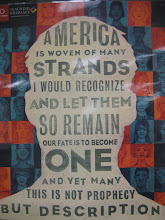"Do Your Little Bit of Good"
Indiana schools have failed. We have failed, and so have 42 other states in the climate survey conducted by the Gay, Lesbian and Straight Education Network (GLSEN). The criteria for “grading” are cited in Carrie Kilman’s “THIS is why we need a GSA” (2007): “the existence of state wide ‘safe schools’ laws; statewide non-discrimination laws; support for education on sexual health and sexuality; local ‘safe schools’ policies; general education issues; and the existence of laws that stigmatize LGBTQ people” (p. 32). If my experiences as a high school English teacher in an extremely diverse Indianapolis high school are any indication of Indiana’s attitudes at large, I am not surprised that we have failed to provide supportive environments for our LGBTQ students.
The first conversation I had with my seniors about homosexuality was in 2002. I don’t remember what started the whole discussion, but I do remember sharing with the class that one of my best friends is a lesbian; I had hoped sharing this would help them understand that straight people can, in fact, co-exist with people who are gay. Instead, I was met with a barrage of ridiculous questions. No one seemed to understand how I didn’t fear her, how I would still be willing to have her spend the night at my house, how I didn’t worry she would try to hit on me. There appeared to be a complete lack of knowledge about homosexuality, and students seemed convinced that if you are gay you are, by default, attracted to everyone of your same sex. Unfortunately, over the last five years I have seen a significant shift, one from absurd ignorance to blatant intolerance. And this has to stop.
Perhaps the major cause of Indiana’s failing marks in the protection of LGBTQ students lies with teachers who “don’t seem to reprimand anti-gay language as often as remarks targeting students’ race, religion or ethnicity” (Kilman, 2007). It seems that, for whatever reason, it is still socially acceptable to discriminate against sexuality. Why? To me, discrimination is discrimination is discrimination. It doesn’t matter if you are rich or poor, Native American or Japanese, gay or straight. It doesn’t matter if I pray to God and you pray to Buddha or if you were born in Canada or grew up in Africa. What does matter is awareness and integrity, and as a teacher, I feel partly responsible for helping my students to develop this awareness and integrity. That is why I refuse to shy away from tough topics; I want each of my students to leave my class as the best possible version of himself, and this sometimes means dealing with discomfort, especially when building tolerance among students. In fact, I sometimes even stage discomfort to create an opportunity for discussion. My latest attempt to trek toward the topic of tolerance was an eye-opening one to say the least.
Each teacher in our school has an advisory period that meets on Thursdays; on this particular morning there were only three students in my room, and none of them seemed particularly motivated to finish their geometry homework or study for their next vocabulary quiz. I perused my shelf of young adult literature and decided to approach Deon, an African American sophomore, with Nancy Garden’s Annie on My Mind. “If you’re not interested in Pythagoras,” I began, “how about a story about a lesbian couple?” Not only did Deon refuse to take the book, he proceeded to harangue all the “fags” of the world for their indecent, sinful ways. I quickly redirected his phrasing from his offensive, three-letter word choice to a more appropriate one, yet the twenty minutes that remained of advisory became a forum for two of my three students to attempt to justify their mistreatment of homosexuals. “My son come home and decide he gay?” Deon said at one point, “I’d whoop ‘im. You gotta beat it out of ‘em so they’ll learn.” At this, Caleb added, “Yeah –and you gotta yell at ‘em so they’ll change their minds!” Finally, Patricia spoke up, citing the Bible and Jesus’ call to his followers to treat each other as they would want to be treated. Although Deon could not be convinced, a look of recognition registered in Caleb’s face. I began emphasizing the importance of treating people as people when the bell rang.
It is critical that we as teachers, whether elementary, middle, or secondary, refuse to accept intolerance of any kind in our classrooms, particularly intolerance directed at sexuality. Not only does narrow-mindedness ruin a productive learning environment, but also, according the GLSEN’s December 2003 climate survey, there is a direct link between harassment and the declining GPAs and college ambitions of LGBTQ students (cited in Kilman, 2007). Even if we are only able to influence one “Caleb” or “Deon” to rethink his treatment of others at a time, we must continue to insist on integrity. After all, in the words of Desmond Tutu, “Do your little bit of good where you are; it’s those little bits of good put together that overwhelm the world.”
Killman, C. (2007).THIS is why we need a GSA. Teaching Tolerance. 30-37.

No comments:
Post a Comment